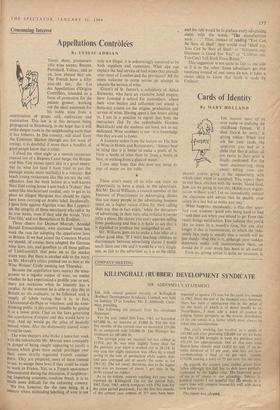Consuming Interest
Appellations ContrO16es
By LESLIE ADRIAN
I dined the other night at a newish restaurant created out of a Regents Canal barge, the Barque and Bite. Coy names apart, this is a good eatery, but its wine list (and I have tried to put the message across more tactfully) is a travesty. But brash young restaurants like this are not the only offenders. Just the week before at a well-known West End eating house I sent back a `Volnay' that tasted like blackcurrant cordial, only to get in its place an alleged Margaux that should by rights have been carrying an Arabic label. Incidentally, I have little against Algerian wine. But I appreci- ate the integrity of those merchants who call it by its .true name, even if they add the words 'Very Fine Old,' and not Beaujolais or St. Emilien.
Three cheers for Dermot Morrah, Arundel Herald Extraordinary, who slammed home last week the case for adopting the appellation laws in Britain. If we had joined the Common Market we'should, of course, have adopted the German wine laws, too, and goodbye to all those gallons of Liebfraumikh that pour on to the market every year. But there is another side to the story, as Mr. Morrah's critics pointed out to him at the Wine Writers' Circle meeting last Thursday.
Because the appellation laws restrict the wine- grower to a regular output of wine, no matter whether he has experienced a prolific year or not, there are occasions when he honestly has a surplus. At the moment he is able to ship this to Britain as yin ordinaire, to be followed with a supply of labels saying that it is, in fact, Chfiteauneuf-du-Pape or whatever, and the wine- drinking public in this country benefits by getting it at a lower price. Clap on the laws governing the appellation d'origine and this would have to stop. And up would go the price of honestly named wines. Also the dishonestly named wines would be rarer.
The wine shippers who broke a lance last week With the redoubtable Mr. Morrah were constantly in danger of being caught appearing to justify a sYstem which gives them unfair privileges over their more strictly regulated French counter- Parts. They are prepared, most of them seemed 1-0 say, to accept these laws if they could be made to work in France. Yet, as a French spokesman demonstrated during the discussion, if neighbour- ing importing countries, condone fraud, it is so imich more difficult for the enforcing country.
We live, however, for the time being, in a Country where misleading labelling of wine is not only not illegal, it is unknowingly connived at by both suppliers and customers. What else can explain the bad service of bad wines that prevails over most of London and the provinces? All the more welcome to come across an attempt to educate the servers of wine.
Grant's of St. James's, a subsidiary of Allied Breweries, who have an extensive hotel empire, have founded a school for sommeliers, where their wine butlers and cellarmen can attend a three-day course on the origins, production and service of wine. Having spent a few hours sitting in, I am in a position to report that both the instructors (led by the redoubtable Gordon Bucklitsch) and the students are keen, not to say dedicated. Wine snobbery is out—it is knowledge that they are out to foster.
A footnote stolen from the lecture on The Sale of Wine in Hotels and Restaurants : 'Always bear in mind that it is better to make a profit of 5s. from a bottle of wine than ls. from a bottle of beer, or nothing from a glass of water.'
.1 can only hope that this does not mean no jugs of water on the table.
There aren't many of us who can resist an opportunity to have a crack at the advertisers. But Mr. David Williams, a council member of the Institute of Practitioners in Advertising, thinks that too many people in the advertising business insist on 'a higher raison d'être for their calling than any that in fact exists,' while the detractors of advertising, in their turn, also criticise it on too lofty a plane. He claims you can't separate selling from producing and that it is futile to say that it is dignified to produce but undignified to sell.
Mr. Williams goes on to make a free Offer of a rather good idea. 'If I were teaching children to discriminate between advertising claims • I would teach them one rule and it would be a very simple one, as fair to the advertiser as it is to the child, and the rule would be to preface every advertising claim with the words "The manufacturer says. . . ." .Thus, instead of reading "You' Can Be Sure of Shell" they would read "Shell say, You Can be Sure of Shell!' or "Guinness say, Guinness is Good For You" or "Unilever say, You Can't Tell Stork From Butter." ' This suggestion is not quite as fair to one side as it is to the other. Some advertisers get two mentions instead of one, some do nat. It takes a clever child to know that Stork is made by Unileyer.






































 Previous page
Previous page